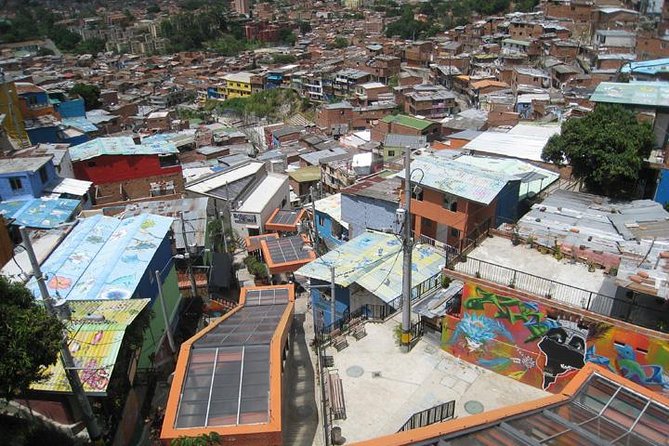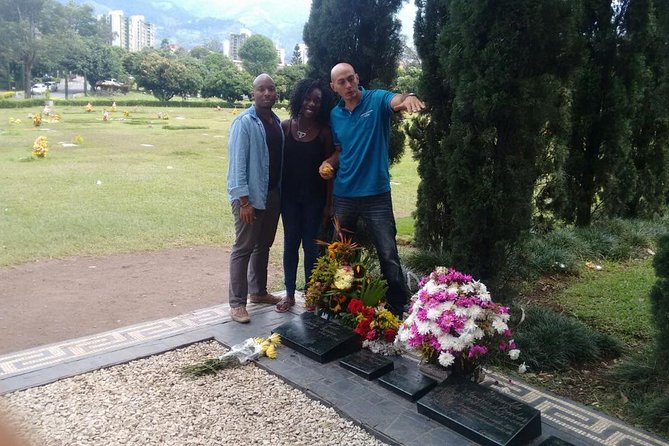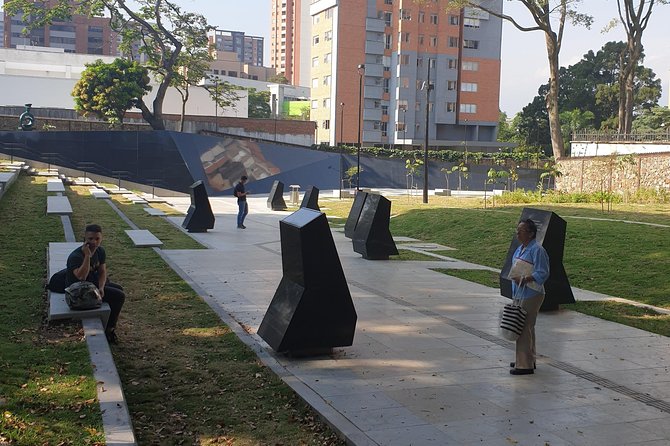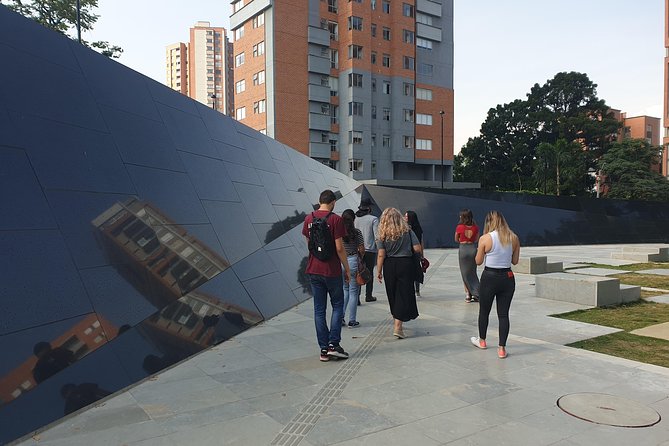Do Not Say That Name
Have you ever wondered why certain names evoke fear or superstition in different cultures?
In various societies, there exists a phenomenon where individuals refrain from uttering specific names due to deep-rooted beliefs or historical events.
This practice of avoiding certain names has intriguing origins and implications that extend beyond mere linguistic taboos.
As we explore the reasons behind this intriguing cultural phenomenon, we will uncover the historical context, societal impact, and potential consequences associated with invoking these forbidden names.
Key Points

- The taboo name in Medellin stems from fear, violence, and societal upheaval.
- Cultural superstitions shape the avoidance of the taboo name.
- Legends and folklore intertwine with the city’s complex history.
- Using polite language alternatives is essential in respectful communication within Medellin.
Origins of the Taboo

The taboo surrounding the mention of a certain name in Medellin’s history has its roots deeply intertwined with the city’s turbulent past and the consequences of a notorious figure’s actions. Linguistic evolution and cultural shifts played a crucial role in shaping the origins of this taboo.
The name became associated with fear, violence, and societal upheaval, leading to its exclusion from everyday conversations. Societal norms dictated the avoidance of this name, reflecting the collective trauma and desire to move forward from a dark chapter in Medellin’s history.
Over time, the taboo surrounding this name became ingrained in the city’s ethos, serving as a reminder of the impact of one individual on an entire community.
Cultural Superstitions and Beliefs

Embedded within the fabric of Medellin’s society are intricate cultural superstitions and beliefs that shape daily interactions and perceptions. Cultural traditions and customs play a significant role in the lives of locals, guiding their behaviors and influencing various aspects of their daily routines.
From specific rituals performed during festivities to the way individuals greet each other, these traditions are deeply ingrained in the community. On top of that, local beliefs and superstitions add another layer of complexity to the city’s cultural tapestry, with stories passed down through generations shaping people’s perspectives on luck, fate, and the supernatural.
Understanding and respecting these customs and beliefs are essential when immersing oneself in the vibrant and diverse culture of Medellin.
Historical Context and Legends
Cultural superstitions and beliefs in Medellin provide a rich backdrop for understanding the city’s historical context and legends. The origins of these myths and legends date back centuries, intertwined with the city’s tumultuous past and vibrant folklore.
Some of the most intriguing tales include:
- The legend of El Dorado, a mythical city of gold believed to be hidden in the Colombian mountains.
- The story of La Llorona, a ghostly figure said to roam the streets at night, crying for her lost children.
- The folklore surrounding the creation of the iconic Botero sculptures, reflecting both history and modernity in Medellin’s artistic landscape.
Impact on Modern Language
Enjoy Medellin’s vibrant language evolution, shaped by a complex tapestry of historical influences and contemporary expressions.
The impact of societal norms on modern language is profound, reflecting the city’s dynamic cultural shifts. Linguistic taboos play a significant role in shaping communication dynamics, with certain words or phrases carrying heavy connotations due to historical events or social sensitivities.
Medellin’s language landscape is a reflection of its complex history, where words hold the power to evoke strong emotions and memories. Understanding these nuances is crucial for effective communication in the city, as language continues to evolve alongside changing attitudes and perceptions.
Taboo Word Alternatives and Etiquette

When navigating social interactions in Medellin, it’s essential to be mindful of taboo word alternatives and etiquette to ensure respectful communication. In this vibrant Colombian city, etiquette norms play a crucial role in daily conversations.
Here are some tips to keep in mind:
- Use Polite Phrases: Employ linguistic creativity to express yourself without offending others.
- Respect Cultural Sensitivities: Be aware of local customs and avoid words that may carry negative connotations.
- Choose Words Wisely: Opt for alternative terms to convey your message effectively while upholding politeness.
Breaking the Silence: Overcoming the Taboo
Breaking through the unspoken barriers, travelers in Medellin are discovering a new narrative that challenges the silence surrounding taboo topics. Exploring societal norms, visitors are actively engaging in conversations that were previously considered off-limits.
By breaking the silence, individuals are pushing boundaries and fostering a more open dialogue on subjects restricted by taboo language norms. Through their interactions with locals and immersion in the culture, travelers are gaining insights into the complexities of these societal restrictions.
This shift towards addressing taboo topics head-on isn’t only breaking down barriers but also encouraging a deeper understanding of the cultural nuances at play. By overcoming the taboo, visitors are contributing to a more inclusive and honest exchange of ideas within the community.
Common questions
Are There Any Specific Rituals or Ceremonies Associated With Breaking the Taboo Surrounding the Forbidden Name?
When it comes to breaking taboos and rituals surrounding forbidden names, various cultures hold unique perspectives. Ritualistic ceremonies can be deeply ingrained in cultural beliefs, offering insights into generational viewpoints and the significance of taboo breaking practices.
How Do Different Generations Within a Culture View the Taboo Differently, if at All?
Generational perspectives within a culture can vary in their views on taboos. Changing attitudes and societal norms influence how different age groups interpret and adhere to cultural taboos. These varying perceptions reflect the evolving dynamics of tradition and modernity.
Are There Any Documented Cases of Individuals Facing Repercussions for Uttering the Forbidden Name?
Legal consequences for uttering the forbidden name have been documented in various cultures. From fines to imprisonment, individuals faced repercussions. Social ostracism is another common outcome, leading to isolation and exclusion within their communities.
What Are Some Common Misconceptions or Myths Surrounding the Origins of the Taboo?
Many people harbor misconceptions and myths regarding the origins of certain taboos. Such beliefs often stem from lack of understanding or misinterpretation of historical events, cultural practices, or the significance of ceremonies and rituals.
How Do Other Cultures or Societies View the Concept of Taboo Words and Names, and Are There Any Similarities or Differences in Their Practices?
Different cultures hold varying perspectives on the concept of taboo words and names. While some view them as sacred, others see them as forbidden due to historical or societal reasons. Cross-cultural beliefs reveal diverse practices.
Last Words
To sum it up, the Pablo Escobar-themed tour in Medellin offers a gripping exploration of the city’s dark past.
With a private guide leading the way, visitors can gain a deeper understanding of the turbulent times and witness the sites where Escobar’s influence once reigned.
This tour provides a unique and educational experience, shedding light on Medellin’s transformation and allowing participants to explore its complex history.
Don’t miss out on this captivating journey through the streets of Medellin.